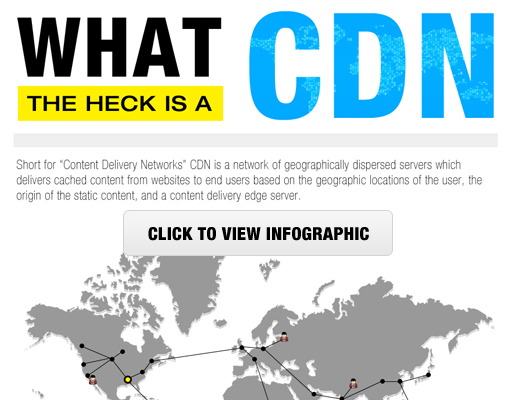Do you need to velocity up your WordPress web site? Quick loading pages enhance consumer expertise, improve your pageviews, and assist along with your WordPress search engine optimisation. On this article, we are going to share essentially the most helpful WordPress velocity optimization tricks to increase WordPress efficiency and velocity up your web site.

Not like different “X greatest WordPress caching plugin” lists or generic “X tricks to dashing up WordPress” tutorials, this text is a complete information to WordPress efficiency optimization.
We embody every part from why velocity is necessary, what slows down your WordPress web site to actionable steps that you would be able to take to enhance your WordPress velocity instantly.
To make it simple, we now have created a desk of contents that can assist you navigate by way of our final information to dashing up your WordPress web site.
Why Speed is Important for Your WordPress Site?
Do you need to velocity up your WordPress web site? Quick loading pages enhance consumer expertise, improve your pageviews, and assist along with your WordPress search engine optimisation. On this article, we are going to share essentially the most helpful WordPress velocity optimization tricks to increase WordPress efficiency and velocity up your web site.
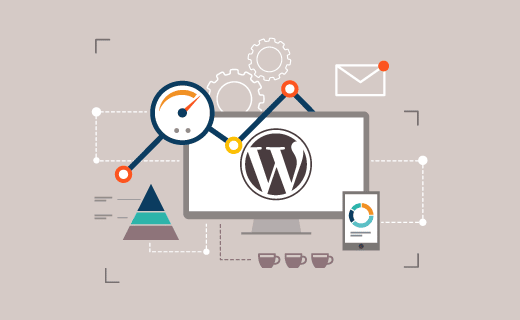
On prime of that, Google and different search engines like google and yahoo have already began penalizing slower web sites by pushing them down within the search outcomes which suggests decrease site visitors for sluggish web sites.
To sum all of it up, if you need extra site visitors, subscribers, and income out of your web site, then you will need to make your WordPress web site FAST!
How to Check Your WordPress Website Speed?
Usually newcomers assume that their web site is OK simply because it doesn’t really feel sluggish on their laptop. That’s a HUGE mistake.
Because you ceaselessly go to your personal web site, fashionable browsers like Chrome retailer your web site in cache and mechanically prefetch it as quickly as you begin typing an handle. This makes your web site load virtually immediately.
Nevertheless, a standard consumer who’s visiting your web site for the primary time might not have the identical expertise.
In actual fact, customers in several geographical areas could have a totally totally different expertise.
Because of this we advocate that you just check your web site velocity utilizing a instrument like Pingdom.
It’s a free on-line instrument that permits you to check your web site’s velocity from totally different areas.
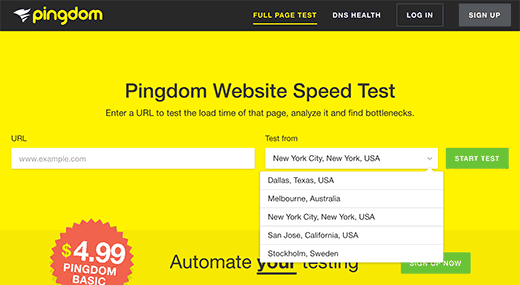
After you run your web site velocity check, you may be questioning what’s an excellent web site velocity that I ought to goal for?
A great web page load time is below 2 seconds.
Nevertheless, the sooner you can also make it, the higher it’s. Just a few milliseconds of enhancements right here and there can add as much as shaving off half or perhaps a full second out of your load time.
What Slows Down Your WordPress Website?
Your velocity check report will probably have a number of suggestions for enchantment. Nevertheless, most of that’s technical jargon which is tough for newcomers to grasp.
Nevertheless understanding what slows down your web site is vital to enhancing efficiency and making smarter long-term selections.
The first causes for a sluggish WordPress web site are:
- Net Internet hosting – When your website hosting server will not be correctly configured it may well harm your web site velocity.
- WordPress Configuration – In case your WordPress web site will not be serving cached pages, then it can overload your server thus inflicting your web site to be sluggish or crash solely.
- Web page Measurement – Primarily photos that aren’t optimized for a net.
- Dangerous Plugins – In case you’re utilizing a poorly coded plugin, then it may well considerably decelerate your web site.
- Exterior scripts – Exterior scripts resembling advertisements, font loaders, and many others may also have a huge effect in your web site efficiency.
Now that what slows down your WordPress web site, let’s check out velocity up your WordPress web site.
Significance of Good WordPress Internet hosting
Your WordPress internet hosting service performs an necessary position in web site efficiency. A great shared internet hosting supplier like BlueHost or Siteground take the additional measures to optimize your web site for efficiency.
Nevertheless, on shared internet hosting you share the server assets with many different clients. Because of this in case your neighboring web site will get plenty of site visitors, then it may well influence your entire server efficiency which in flip will decelerate your web site.
However, utilizing a managed WordPress internet hosting service provide the most optimized server configurations to run WordPress. Managed WordPress internet hosting firms additionally provide computerized backups, computerized WordPress updates, and extra superior safety configurations to guard your web site.
We advocate WPEngine as our most well-liked managed WordPress internet hosting supplier. They’re additionally the preferred one within the trade. (See our particular WPEngine coupon).
For enterprise WordPress internet hosting, we advocate utilizing Pagely as a result of they’re the most effective in the enterprise.
Rushing Up WordPress in Straightforward Steps (No Coding)
We all know that making adjustments to your web site configuration is usually a terrifying thought for newcomers, particularly should you’re not a tech-geek.
However don’t fear, you’re not alone. We now have helped hundreds of WordPress customers enhance their WordPress efficiency.
We’ll present you how one can velocity up your WordPress web site with only a few clicks (no coding required).
In case you can point-and-click, you are able to do this!
Set up a WordPress Caching Plugin
WordPress pages are “dynamic.” This implies they’re constructed on the fly each time somebody visits a put up or the web page in your web site. To construct your pages, WordPress has to run a course of to search out the required data, put all of it collectively, after which show it to your consumer.
This course of entails plenty of steps, and it may well actually decelerate your web site when you’ve got a number of folks visiting your web site directly.
That’s why we advocate each WordPress web site use a caching plugin. Caching can make your WordPress web site anyplace from 2x to 5x sooner.
Right here’s the way it works: As an alternative of going by way of the entire web page technology course of each time, your caching plugin makes a replica of the web page after the primary load, after which serves that cached model to each subsequent consumer.
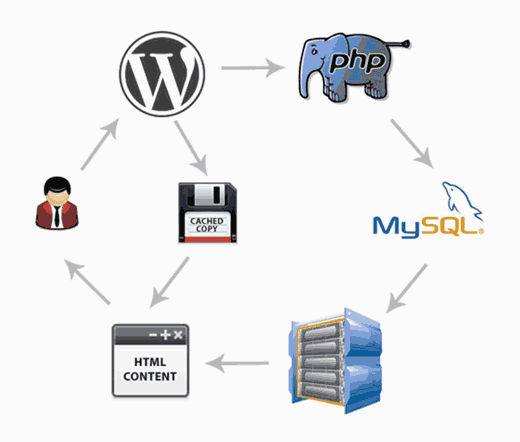
As you may see within the graphics above, when a consumer visits your WordPress web site, which is constructed utilizing PHP, your server retrieves data from a MySQL database and your PHP recordsdata, after which it’s all put collectively right into a HTML content material which is served served to the consumer. It’s an extended course of, however you may skip plenty of it whenever you use caching as an alternative.
There are plenty of caching plugins out there for WordPress, however we advocate utilizing the WP Tremendous Cache plugin. Take a look at our step-by-step information on set up and setup WP Tremendous Cache in your WordPress web site. It’s not troublesome to arrange, and your guests will discover the distinction.
Notice: In case you’re utilizing a managed WordPress internet hosting supplier, then you definitely don’t want a caching plugin as a result of they care for it for you.
Optimize Photographs for Pace
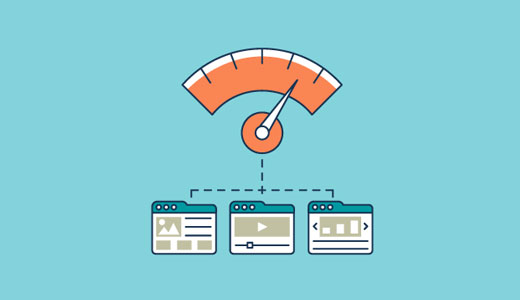
Photographs deliver life to your content material and assist increase engagement. Researchers have discovered that utilizing coloured visuals makes folks 80% extra prone to learn your content material.
But when your photos aren’t optimized, they may very well be hurting greater than serving to. In actual fact, non-optimized photos are probably the most widespread velocity points we see on newbie web sites.
Earlier than you add a photograph straight out of your cellphone or digital camera, we advocate that you just use picture enhancing software program to optimize your photos for a net.
Of their authentic codecs, these images can have enormous file sizes. However, primarily based on the picture file format and the compression you select in your enhancing software program, you may lower your picture measurement by as much as 5x.
At WPBeginner, we solely use two picture codecs: JPEG and PNG.
Now you may be questioning: what’s the distinction?
Nicely, PNG picture format is uncompressed. While you compress a picture it loses some data, so an uncompressed picture will likely be increased high quality with the extra element. The draw back is that it’s a bigger file measurement, so it takes longer to load.
JPEG, however, is a compressed file format which barely reduces picture high quality. However, it’s considerably smaller in measurement.
So how can we determine which picture format to decide on?
- If our picture or picture has plenty of totally different colors, then we use JPEG.
- If it’s a less complicated picture or we want a clear picture, then we use PNG.
Nearly all of our photos are JPEGs.
Under is a comparability chart of the file sizes and totally different compression instrument that we may have used for the StrangeLoop picture used above.
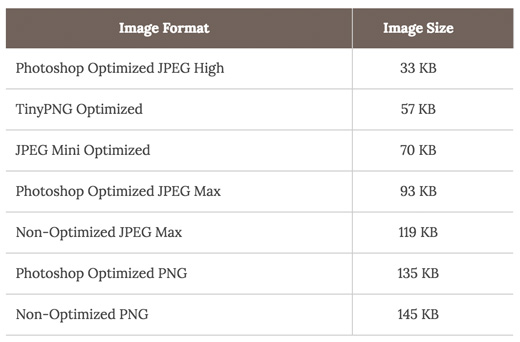
As you may see from the chart, the picture format you employ could make a HUGE distinction in your web site efficiency.
For particulars on precisely optimize your photos utilizing Photoshop and different standard enhancing instruments, with out sacrificing high quality, see our step-by-step information on saving photos optimized for a net.
WordPress Efficiency Optimization Finest Practices
After putting in a caching plugin and optimizing your photos, you’ll discover your web site will begin loading quite a bit sooner.
However should you actually need to maintain your web site as quick as attainable, you’ll want to make use of the most effective practices listed beneath.
The following tips aren’t too technical so that you don’t have to know any code to implement them. However, utilizing them will forestall widespread issues that may decelerate your web site.
Hold Your WordPress Website Up to date

As a properly maintained open supply venture, WordPress is up to date ceaselessly. Every replace won’t solely provide new options, but additionally, repair safety points and bugs. Your WordPress theme and plugins might have common updates, too.
As a web site proprietor, it’s your accountability to maintain your WordPress website, theme, and plugins up to date to the most recent variations. Not doing so might make your website sluggish and unreliable, and make you susceptible to safety threats.
For extra particulars on the significance of updates, see our article on why it’s best to all the time use the most recent WordPress model.
Use Excerpts on Homepage and Archives
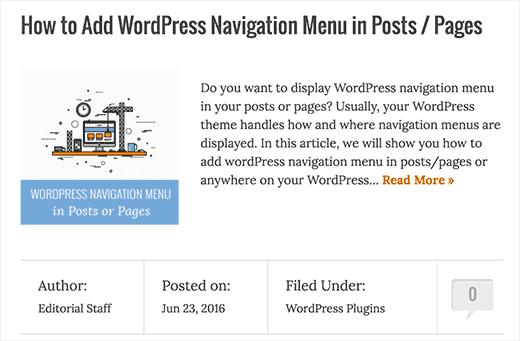
By default, WordPress shows the full content material of every article in your homepage and archives. This implies your homepage, classes, tags, and different archive pages will all load slower.
One other drawback of exhibiting full articles on these pages is that customers don’t really feel the necessity to go to the precise article. This could reduce your pageviews, and the time your customers spend on your website.
So as to velocity up your loading occasions for archive pages, you may set your website to show excerpts as an alternative of the complete content material.
You’ll be able to navigate to Settings » Studying and choose “For every article in a feed, present: Abstract” as an alternative to “Full Textual content.”

For extra particulars on the professionals and cons of displaying summaries, see our article on full put up vs abstract (excerpt) in your WordPress archive pages.
Break up Feedback into Pages
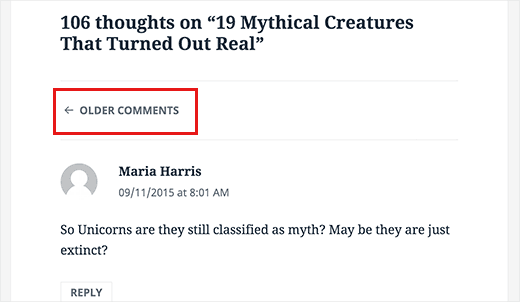
Getting a number of feedback in your weblog posts? Congratulations! That’s an ideal indicator of engaged viewers.
However, the draw back is, loading all these feedback can influence your web site’s velocity.
WordPress comes with a built-in answer to that. Merely go to Settings » Dialogue and examine the field subsequent to the “Break feedback into pages” choice.
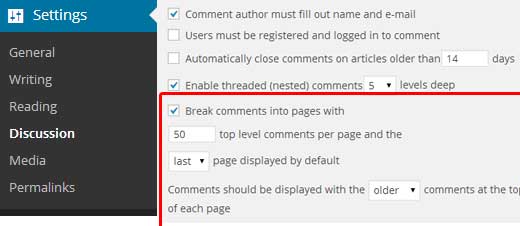
For extra detailed directions, see our information on paginate feedback in WordPress.
Use a Content material Supply Community (CDN)
Bear in mind how we talked about above that customers in several geographical areas might expertise totally different loading occasions in your web site?
That’s as a result of the placement of your website hosting servers can have an effect in your web site velocity. For instance, let’s say your website hosting firm has its servers in america. A customer who’s additionally in america will typically see sooner loading occasions than a customer in India.
Utilizing a CDN, or Content material Supply Community, may also help to hurry up loading occasions for your whole guests.
A CDN is a community made up of servers all around the globe. Every server will retailer “static” recordsdata used to make up your web site. Static recordsdata are unchanging recordsdata resembling photos, CSS, and JavaScript, not like your WordPress pages that are “dynamic” as defined above.
While you use a CDN, each time a consumer visits your web site they’re served these static recordsdata from whichever server is closest to them. Your individual website hosting server will even be sooner for the reason that CDN is doing plenty of the work.
You’ll be able to see the way it works on this infographic.
We use MaxCDN on all our initiatives, together with right here on WPBeginner. It really works properly with WordPress web sites and enhances your present WordPress caching plugins for even sooner loading occasions. See our information on set up and setup WordPress CDN answer MaxCDN to get began.
Don’t Add Movies On to WordPress

You can straight add movies to your WordPress web site, and it’ll mechanically show them in an HTML5 participant…
However, it’s best to NEVER do this!
Internet hosting movies will price you bandwidth. You could possibly be charged overage charges by your website hosting firm, or they might even shut down your web site altogether, even when your plan contains “limitless” bandwidth.
Internet hosting movies additionally will increase your backup sizes tremendously, and makes it troublesome so that you can restore WordPress from backup.
As an alternative, it’s best to use a video internet hosting service like YouTube, Vimeo, DailyMotion, and many others., and allow them to care for the onerous work. They’ve the bandwidth for it!
WordPress has a built-in video embed function, so you may copy and paste your video’s URL straight into your put up and it’ll embed mechanically.
Discover out extra particulars on the way it works in our information on embedding movies in WordPress.
Use a Theme Optimized For Pace

When choosing a WordPress theme on your web site, it’s necessary to pay particular consideration to hurry optimization. Some stunning and impressive-looking themes are literally poorly coded and may sluggish your web site approach down.
It’s often higher to go along with a less complicated theme and use high quality plugins to get the options you want, than to decide on a theme that’s bloated with complicated layouts, flashy animations, and different pointless options.
Premium WordPress theme retailers like StudioPress, Themify, and Array Themesoffer themes which are properly coded and optimized for velocity. You can even try our article on choosing the proper WordPress theme for recommendation on what to search for.
Earlier than you activate your new theme, see our information on correctly change your WordPress theme for a easy transition.
Use a Quicker Slider Plugin
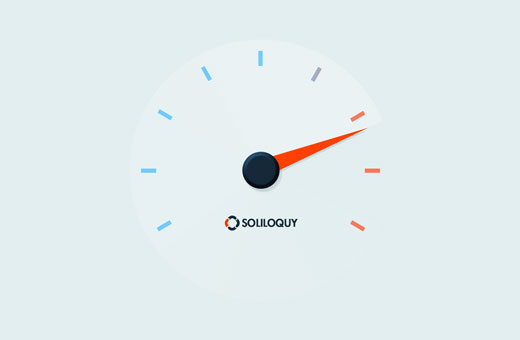
Sliders are one other widespread net design aspect that may make your web site sluggish.
Even when your photos are all optimized as described above, a poorly coded slider plugin will imply all of your work is wasted.
We in contrast the greatest WordPress slider plugins for efficiency and options, and Soliloquy was the quickest by far.
Right here’s the way it compares to different standard slider plugins.
| Slider Plugin | Web page Load time | Requests | Web page measurement |
|---|---|---|---|
| Soliloquy | 1.34 secs | 26 | 945 KB |
| Nivo Slider | 2.12 secs | 29 | 1 MB |
| Meteor | 2.32 secs | 27 | 1.2 MB |
| Revolution Slider | 2.25 secs | 29 | 1 MB |
| LayerSlider | 2.12 secs | 30 | 975 KB |
Use a Quicker Gallery Plugin
When you’ve got a photography website or a portfolio, then you definitely’ll most likely need to use a picture gallery plugin to show your images.
It’s actually necessary that you just use a WordPress gallery plugin that’s optimized for velocity.
We advocate utilizing Envira Gallery, which is the greatest WordPress gallery plugin out there. It permits you to create stunning picture galleries which are lightning quick to load.
We examined its velocity in comparison with a few different standard gallery plugins, and located that Envira Galley is sort of twice as quick:
| Gallery Plugin | Web page Load time | Requests | Web page measurement |
| Envira Gallery | 1.08 secs | 24 | 1MB |
| Foo Gallery | 1.89 secs | 23 | 357.1KB |
| NextGEN | 1.88 secs | 33 | 518KB |
Superb-Tuning WordPress for Pace (Superior)
By utilizing the WordPress optimization greatest practices and fundamental velocity ideas listed above, it’s best to see an enormous enchancment in your web site’s loading occasions.
However each fraction of a second counts. If you wish to get the very quickest velocity attainable, you’ll want to make a number of extra adjustments.
The next ideas are a bit of extra technical, with some requiring you to switch your web site recordsdata or have a fundamental understanding of PHP. You’ll need to ensure that to backup your web site first simply in case.
Break up Lengthy Posts into Pages

Readers have a tendency to like weblog posts which are longer and extra in-depth. Longer posts even are likely to rank increased in search engines like google and yahoo.
However should you’re publishing lengthy type articles with a number of photos, it may very well be hurting your loading occasions.
As an alternative, think about splitting up your longer posts into a number of pages.
WordPress comes with built-in performance to do this. Merely add the <!––nextpage––> tag in your article the place you need to break up it into subsequent web page. Do this once more if you wish to break up the article on to the subsequent web page as properly.
For extra detailed directions, see our tutorial on put up pagination – break up WordPress posts into a number of pages.
Cut back Exterior HTTP Requests
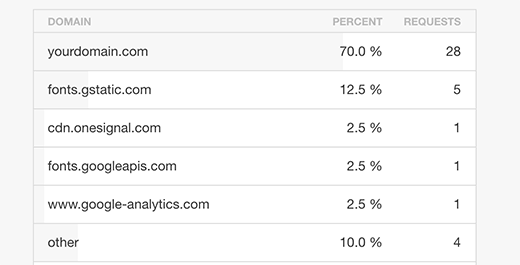
Many WordPress plugins and themes load all types of recordsdata from different web sites. These recordsdata can embody scripts, stylesheets, and pictures from exterior assets like Google, Fb, analytics providers, and so forth.
It’s okay to make use of a number of of those. Many of those recordsdata are optimized to load as rapidly as attainable, so it’s sooner than internet hosting them by yourself web site.
However in case, your plugins are making plenty of these requests, then it may decelerate your web site considerably.
You’ll be able to cut back all these exterior HTTP requests by disabling scripts and types or merging them into one file. Right here’s a tutorial on disable your plugins’ CSS recordsdata and JavaScript.
Cut back Database Calls
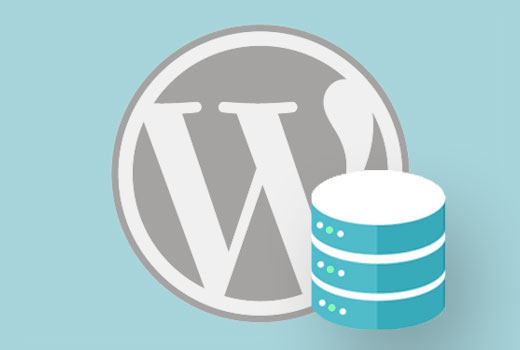
Notice: This step is a bit more technical and would require fundamental information of PHP and WordPress template recordsdata.
Sadly, there are plenty of poorly coded WordPress themes on the market. They ignore WordPress commonplace practices and find yourself making direct database calls, or too many pointless requests to the database. This could actually decelerate your server by giving it an excessive amount of work to do.
Even well-coded themes can have code that makes database calls simply to get your weblog’s fundamental data.
On this instance, each time you see <?php, that’s the beginning of a brand new database name:
|
1
2
3
4
|
<html xmlns="http://www.w3.org/1999/xhtml" dir="<?php language_attributes(); ?>"><head profile="http://gmpg.org/xfn/11"><meta http-equiv="Content material-Kind" content material="<?php bloginfo('html_type'); ?> charset=<?php bloginfo('charset'); ?>" /> |
You’ll be able to’t blame theme builders for that. They merely don’t have any different technique to discover out what language your web site is in.
However, if you’re customizing your website utilizing a baby theme, then you may change these database calls along with your particular data with the intention to cut back all these database calls.
|
1
2
3
|
<html xmlns="http://www.w3.org/1999/xhtml" dir="ltr"><head profile="http://gmpg.org/xfn/11"><meta http-equiv="Content material-Kind" content material="textual content/html; charset=UTF-Eight" /> |
Assessment your dad or mum theme for cases like this that may be simply changed with static data.
Optimize WordPress Database
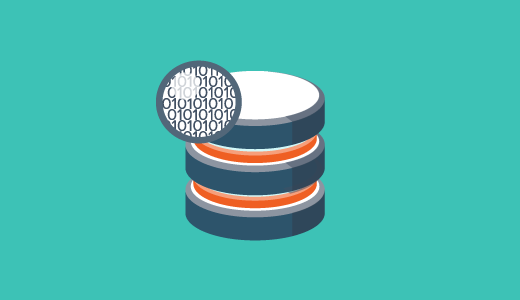
After utilizing WordPress for some time, your database could have a number of data that you just most likely don’t want any extra. For improved efficiency, you may optimize your database to eliminate all that pointless data.
This may be simply managed with the WP-Sweep plugin. It permits you to clear your WordPress database by deleting issues like trashed posts, revisions, unused tags, and many others. It would additionally optimize your database’s construction with only a click on.
See our information on optimizing and clear up your WordPress database for improved efficiency.
Restrict Put up Revisions
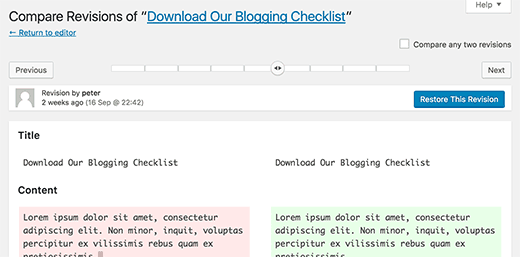
Put up revisions take up area in your WordPress database. Some customers imagine that revisions may also have an effect on some database queries run by plugins. If the plugin doesn’t particularly exclude put up revisions, it would decelerate your web site by looking by way of them unnecessarily.
You’ll be able to simply restrict the variety of revisions WordPress retains for every article. Merely add this line of code to your wp-config.php file.
|
1
|
outline( 'WP_POST_REVISIONS', four ); |
This code will restrict WordPress to solely save your final four revisions of every put up or web page, and discard older revisions mechanically.
Disable Hotlinking and Leaching of Your Content material

In case you’re creating high-quality content material in your WordPress website, then the unhappy reality is that it’ll most likely get stolen ultimately.
A technique this occurs is when different website serve your photos straight from their URLs in your website, as an alternative of importing them to their very own servers. In impact, they’re stealing your website hosting bandwidth, and also you don’t get any site visitors to indicate for it.
Merely add this code to your .htaccess file to dam hotlinking of photos out of your WordPress web site.
|
1
2
3
4
5
6
|
#disable hotlinking of photos with forbidden or customized picture choiceRewriteEngine onRewriteCond % !^$RewriteCond % !^http(s)?://(www.)?wpbeginner.com [NC]RewriteCond % !^http(s)?://(www.)?google.com [NC]RewriteRule .(jpg|jpeg|png|gif)$ – [NC,F,L] |
Notice: Don’t overlook to alter wpbeginner.com with your personal area.
Some content material scraping web sites mechanically create posts by stealing your content material out of your RSS feed.
That’s it! We hope this text helped you be taught some helpful tips to hurry up WordPress and increase efficiency.
Go forward and check out a few of these methods. Remember to check your web site’s velocity earlier than and after, and tell us your ends in the feedback.
